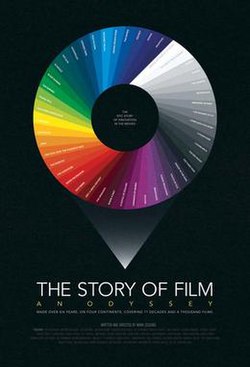| The Story of Film: An Odyssey | |
|---|---|
 Film poster | |
| Genre | Documentary |
| Based on | The Story of Film by Mark Cousins |
| Written by | Mark Cousins |
| Directed by | Mark Cousins |
| Narrated by | Mark Cousins |
| Country of origin | United Kingdom |
| Original language | English |
| No. of episodes | 15 |
| Production | |
| Producer | John Archer |
| Editor | Timo Langer |
| Running time | 915 minutes |
| Production company | Hopscotch Films |
| Original release | |
| Network | More4 |
| Release | 3 September – 10 December 2011 |
The Story of Film: An Odyssey is a 2011 British documentary film about the history of film, presented on television in 15 one-hour chapters with a total length of over 900 minutes. It was directed and narrated by Mark Cousins, a film critic from Northern Ireland, based on his 2004 book The Story of Film. [1] [2]
Contents
The series was broadcast in September 2011 on More4, the digital television service of British broadcaster Channel 4. The Story of Film was featured in its entirety at the 2011 Toronto International Film Festival, [3] and at the 2012 Istanbul International Film Festival. [4] It was exhibited at the Museum of Modern Art in New York City in February 2012. [1] It was broadcast in the United States on Turner Classic Movies, beginning in September 2013. [5]
The Telegraph headlined the series' initial broadcast in September 2011 as the "cinematic event of the year", describing it as "visually ensnaring and intellectually lithe, it’s at once a love letter to cinema, an unmissable masterclass, and a radical rewriting of movie history." [6] An Irish Times writer called the programme a "landmark" (albeit a "bizarrely underpromoted" one). [7] The programme won a Peabody Award in 2013 "for its inclusive, uniquely annotated survey of world cinema history." [8]
In February 2012, A. O. Scott of The New York Times described Cousins' film as "a semester-long film studies survey course compressed into 15 brisk, sometimes contentious hours" that "stands as an invigorated compendium of conventional wisdom." Contrasting the project with its "important precursor (and also, perhaps, an implicit interlocutor)", Jean-Luc Godard’s Histoire(s) du cinéma , Scott commended Cousins' film as "the place from which all future revisionism must start". [1]